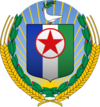Namorese nationality law
| Nationality Law of the People's Republic of Namor Намора Имингука Гукче Фато | |
|---|---|
 Emblem of Namor | |
| Central Council of the People's Republic of Namor | |
| Enacted by | 7th Namorese Central Council |
| Date passed | August 10, 1955 |
| Date assented to | August 11, 1955 |
| Date commenced | August 11, 1955 |
| Status: In force | |
The Namorese nationality law concerns nationality, citizenship, and naturalization in the People's Republic of Namor. The Nationality Law of the People's Republic of Namor was passed by the Namorese Central Council in 1955, months after the new constitution of Namor was ratified. The main characteristics of Namor's nationality law include its basis on jus sanguinis and differentiation between nationality and citizenship.
Acquisition of nationality
Birth
Any person who is born to a parent who is a Namorese national is a Namorese national by right, regardless of the person's place of birth. If the person is born to Namorese nationals outside of Namor, the birth must be registered with a Namorese diplomatic mission for the person to receive documentation of nationality and citizenship.
Foreign-born children adopted by Namorese parents receive Namorese nationality and citizenship once they permanently reside in Namor.
All Namorese citizens are Namorese nationals, but not all Namorese nationals are automatically considered to be Namorese citizens. People born in Namorese Territory under Luziycan Administration (NTLA) who can trace their ancestry to Namorese living in Namor prior to 1897 are non-citizen nationals of Namor from birth — nationals of Namor by right, but not citizens of Namor by right. Non-citizen nationals can only obtain Namorese citizenship by naturalization.
Naturalization
Naturalization in Namor is rare due to the country's large population and aversion to mass immigration. The conditions for naturalization vary according to the legal status of the non-citizen prior to obtaining Namorese citizenship. All applications for naturalization are reviewed by the Ministry of Public Security, which reserves the right to reject an application even if the applicant meets all requirements.
Conditions for foreign nationals
- Be a spouse or relative of a Namorese national
- Permanently reside in Namor (excluding NTLA) for over 15 years
- Demonstrate the ability to read, speak, and write Namorese at an intermediate level
- Obey Namorese laws
- Fulfill all obligations required of permanent residents in Namor, including the payment of taxes and the prompt registry as a person eligible to be called up for military service (if between the ages of 18 and 25)
Conditions for non-citizen nationals of Namor
- Demonstrate proof of birth in NTLA and descent from Namorese living in Namor prior to 1897
- Permanently reside in Namor (excluding NTLA)
- Obey Namorese laws
- Fulfill all obligations required of permanent residents in Namor, including the payment of taxes and the prompt registry as a person eligible to be called up for military service (if between the ages of 18 and 25)
Loss of citizenship
A person automatically loses Namorese citizenship by becoming a citizen of a foreign country, joining a foreign military, or committing acts of treason against the People's Republic of Namor. A person can apply to renounce Namorese citizenship at a Namorese embassy or consulate, provided that there is sufficient proof the person committed an act that warrants the loss of Namorese citizenship. Anyone who renounces Namorese citizenship must pay a P10,000 (1,429 USD) renunciation fee.
Reacquisition of citizenship
The nationality law contains a process of reacquiring Namorese citizenship for foreign nationals who were born Namorese before residing abroad and acquiring the citizenship of another country. Foreign nationals who were born Namorese may reacquire Namorese citizenship by permanently residing in Namor (excluding NTLA) for five years, demonstrating knowledge of Namorese, obeying Namorese laws, and fulfilling all obligations required of permanent residents in Namor.
Rights and responsibilities
The Constitution of Namor gives Namorese citizens who are 18 years of age or older the right to vote. Namorese citizens who are 30 years of age or older may run for Central Council, and citizens 40 years of age or older may run for President-General. However, the right to vote and run for public office does not apply to convicted felons. In addition to the constitution, the Nationality Law grants all Namorese citizens the right to bear a Namorese passport and all Namorese nationals — including non-citizen nationals — the right to live and work indefinitely in Namor.
Article 38 states that all Namorese are "obliged to pledge their loyalty to the People's Republic by upholding the Constitution and laws of the People's Republic, defending the People's Republic from internal and external threats and fighting for the People's Republic in times of peril." However, it is not explicitly clear whether "all Namorese" includes non-citizen nationals of Namor.
The Nationality Law requires that all Namorese citizens and permanent residents in Namor pay taxes to the Namorese government and perform military service for Namor if necessary. All Namorese citizens and permanent residents in Namor must register as a person eligible to be called up for military service within 30 days of their 18th birthday. Foreign nationals who acquire permanent residency status in Namor or become Namorese citizens between the ages of 18 and 25 are automatically registered.
Visa requirements
As of 2018, Namorese citizens may travel to any member state of the Esquarian Community without a visa for up to 90 days in any 180-day period.